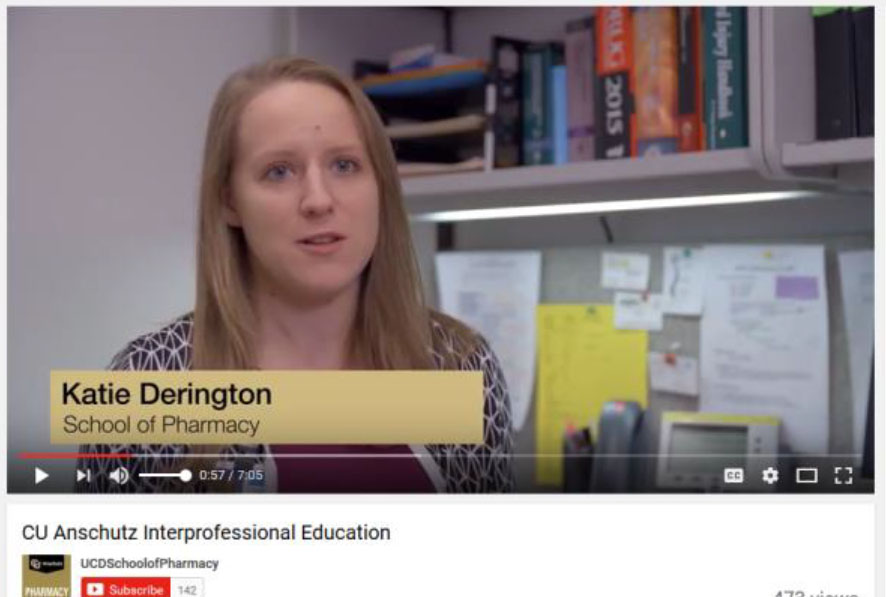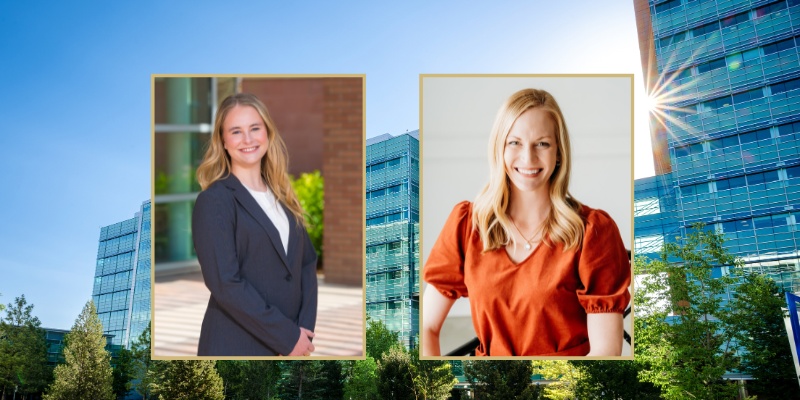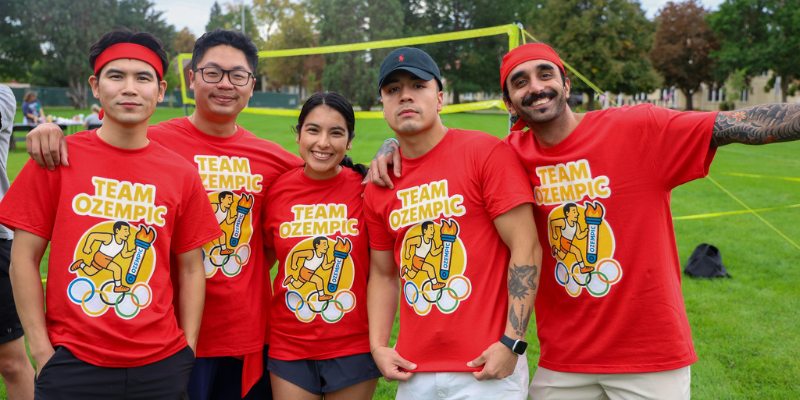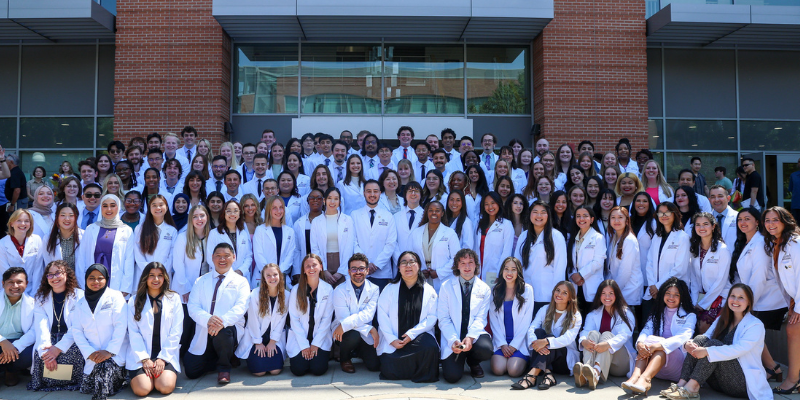Discover why CU’s Anschutz Medical Campus is leading the nation in how it educates the next generation of health care professionals. Find out how students and faculty from all disciplines learn from each other and work together to provide the best outcomes for patients. Don't take our word for it, check out what students have to say about the interprofessional education they are receiving at CU Anschutz Medical Campus.
"This campus was built for interprofessional education and increasingly we're finding students are coming here because that's what they're looking for," says Founding Director Interprofessional Education Mark Earnest, MD, PhD.
"When was looking at different schools I.P.E. (Interprofessional education) definitely was a factor in where I would want to go. Being able to have simulation labs and just experience a patient scenario with these other students that I'm going to school with was something that I wouldn't really have an opportunity to experience anywhere else," says College of Nursing student Jessica Bajema.
According to School of Dental Medicine student Christopher Klekamp, "It's definitely an interprofessional education. You do work with all the students from all the different professions. Sometimes it can be hard to see how dentistry fits in. But you get a lot out of it and you learn a lot from your peers from the other schools to see how their education's different, and how it can affect your treatment of patients later in the clinic."
"In this team based learning environment you really have to work together and learn together, and be comfortable with being uncomfortable. That's what team based learning is all about. And be willing to be vulnerable in front of your other teammates and say, 'I don't know this, do you know this?' 'Cause that's what it's all about in the real world when you go out on rotations, and when you go into your profession. You're going to encounter things that you don't know and you have to learn on the spot," says Skaggs School of Pharmacy student Katie Derington.
"With the IPED classes because it's more thought. It's ethics. It's how do we work together, how do I listen to you, how do you listen to me. The experience tends to be more global," says Julie Koeppe College of Nursing.
Earnest says, "People think intuitively about teamwork and don't really question it. If you ask most people they'll say they're great at team work but the reality is most of us aren't. We have a set of defaults that we use, and yet teamwork is really the key to quality and safety in healthcare now. We've taken the approach that teamwork requires skill, it requires practice, it requires knowledge and we want to bring all those elements together for our students to work in teams, to practice in teams. And to do that over and over again so that they're successful, so that they experience failure and that they learn from that process."
Leading the Country
"The interprofessional education program on the Anschutz Medical Campus is one of the leaders across the country. Often times students might learn about some of these skills within their own curriculum but they never really get the chance to practice that in a team environment and that's where the I.P.E curriculum really helps propel our students ahead of others," says Amy Barton, PhD, RN with the College of Nursing.
Earnest continues, "We can do this stuff together, but if we're not engaging the patient, if we're not thinking about what's in their best interest and we're not doing that systematically and in a way that respects the values of the patient and ethical traditions that undergird our professions, we're going to fail at all of it."
"I know that patients are very perceptive in terms of how things are going and what's working and what isn't. And so for their sake I think we need to work together as well as possible," says Lindsey Meyer, Physicians Assistant Program.
"Here at the University of Colorado we believe that the most powerful learning is by doing and so our courses are experiential. You learn in teams by solving problems. You do that in our team based learning in a classroom setting. We do that in our simulation center in the Cape, and you do it in clinical settings around real patients," says Earnest.
Derington, one of the student leaders at the DAWN clinic, says "DAWN Clinic is so different from other healthcare arenas. In any one setting they may see three or four different healthcare professionals, which is kind of amazing for what we're able to accomplish within their visit frame."
"DAWN is an interprofessional student run free clinic focused on providing the underserved patients of Aurora, specifically uninsured patients that can't get insurance, a place to come in and receive primary care. It was designed to be a venue for interprofessional students from the Anschutz Campus to be able to come in and actually practice taking care of patients in teams together. And to be that natural outflow of what they're learning on campus actually being in the community working with each other to provide care," says Kari Mader, MD School of Medicine.
Jenna Walton, Physical Therapy student, concurs, "I think that what DAWN really provides for students is a real life application of how to work together in a team, but to also remind you that you have one small piece of the puzzle. For me as a physical therapy student, I'm always thinking musculoskeletal and function, but working in these teams I get to see the medical side of things. I get to see what the pharmacist's viewpoint is, and it helps me become a better clinician, because I can sort of see how all these pieces fit together, and I can look at my patients with a more global sense."
According to Aubrey Jones, School of Pharmacy student, "So, the Cape Center is probably my favorite part of the whole IPED program because you take all of the concepts and all of the team building and group work that you did during the IPED course and you get to apply it. You go through two scenarios, one of ours we did really well, we worked really well as a team, we were able to handle the situation, and then one of them was just a complete failure. As the stress rises and the tension rises it's harder to work as a team and it's harder to communicate. It really spoke to the importance of trusting your teammates and really communicating and coming together when things are going wrong."
Working Together Ensures Patient Comes First
"It really comes down to how well you can work in a team and honestly that's what you're graded on, and more importantly that's what determines if the patient you're taking care of is getting good care," says Kenji Tanabe, School of Medicine.
Klekamp says, "One of the things that I got out of IPE so much is that we do have different roles. We're not trying to all fulfill the same role. We have strengths, we have weaknesses, and it's really important to be able to communicate between the professions for the patient's best interest."
"Each health profession contributes something a little different to the care of the patient. It's important that the team members learn how to work together effectively in order to achieve the best outcomes for the patient," says Barton.
"We will continue to improve all of those cultural elements while we're advancing technology, while we're advancing therapeutics. And that's going to result in better outcomes for patients over the next five to ten years because that's the way we really need to work. Healthcare is a team sport and we have the essential ingredients here on this campus to deliver on that in a very impactful way," says Chief Quality & Patient Safety Officer with Children's Hospital Colorado Daniel Hyman, MD.
Barton says, "I see interprofessional education as really setting the stage for the change in culture that's occurring in healthcare settings."
"We used to think that smart people with a lot of knowledge delivered the best care. What we've found is smart people with all the knowledge who don't work together, it doesn't matter how smart you are the care fails and it fails quite frequently. Teamwork, collaboration, that's the only way for us to get to quality, and it's the only way for us to ensure safety for our patients. It's the future," says Earnest.



